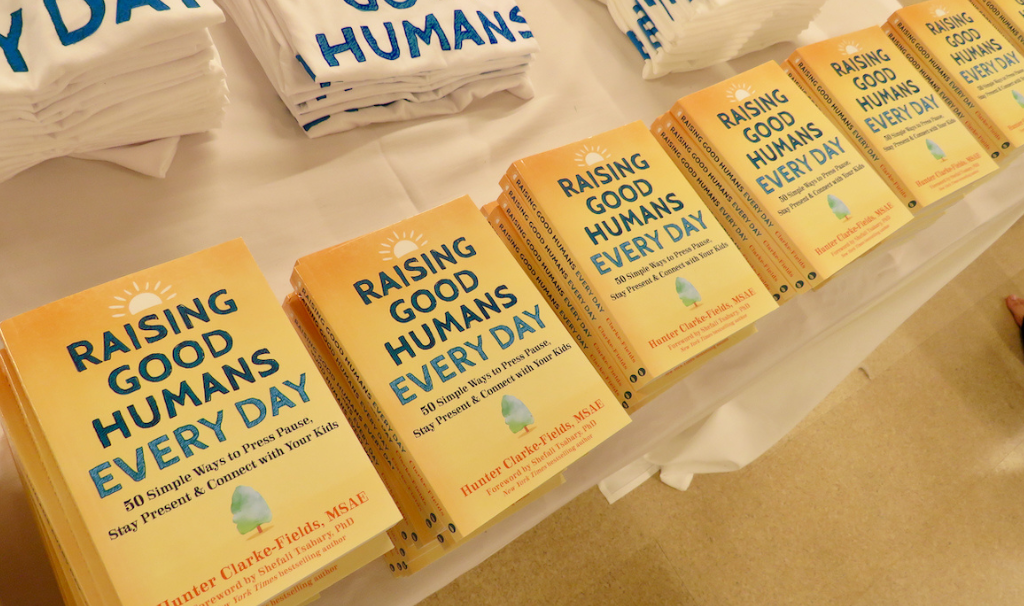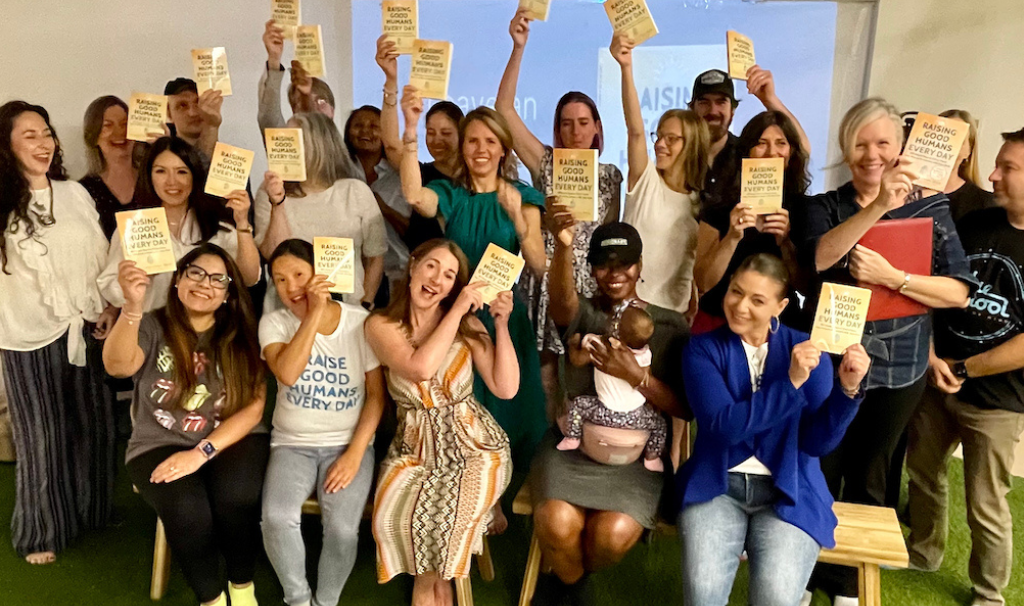
Excerpt from "Raising Good Humans Every Day: 50 Simple Ways to Press Pause, Stay Present & Connect with Your Kids"
Introduction: Parenting is H.A.R.D.
“Parents feel overstretched, overcommitted, underprepared, and underappreciated” —Hal Runkel
Parenting is hard for all of us. From the loneliness to the stress, time with our little ones can be physically, mentally, and psychologically exhausting. While adorable, our kids can be so messy, thoughtless, relentlessly whiney, and loud that we want to crawl into a corner and hide. Plus, often one adult is doing the whole thing on their own! In the western world, we live as nuclear families, without a tribe of extended family—or nearby friends—to support us. One parent is often left as the only adult, home alone with one or more little humans: it’s a recipe for stress, unhappiness, and instability.
I found myself more or less in that position when my daughter was 18 months old. I’d elected to stay home with our child and my husband was working full time. My parents were a seven-hour drive away, so for the vast majority of the time it was up to me to raise my daughter to be the best she could be. My job was to make sure that she was healthy, thriving, and happy. I was supposed to give her the best foods for her growing body, play with her and read to her. I was supposed to ensure that she felt secure—to instill confidence and self-esteem which are vital to living a good life. My job was to be there for her day and night.
My intention was to be loving, connected, and kind, but firm. I would communicate calmly and skillfully, giving my child my best self. I envisioned that she would respond to this loving treatment with smiles and easy cooperation. We would be the embodiment of an ideal social media mom-post: holding hands as she smiled up at me lovingly. I would feel nothing but ease, love, and joy as a parent.
The reality of parenting slapped me in the face. My baby was cranky and highly sensitive to changes in the environment. She cried and fussed a lot. As a toddler she let me know that she did not like my parenting style (the “firm” part) with some big, loud “no’s” and plenty of crying. Despite my best intentions, I found myself triggered, intensely frustrated, and shouting at her. I scared her. Then, seeing the fear and disconnection in her eyes, I felt ashamed and guilty for not meeting my own expectations.
The truth is that I was filled with anxiety. I was scared that I was fundamentally messing up my precious child. Wasn’t it up to me to ensure that she was secure and happy? Yet, here I was doing exactly the opposite of that because of my temper. Was I irrevocably damaging my child? Would she always be so resistant to me? Instead of the loving relationship I wanted, was I doomed to repeat the combative and difficult relationship I had with my own father?
You may have some of the same fears. We know that parenting can make a big difference to an individual’s health, happiness, and wellbeing. Yet, for many of us—largely alone for hours and hours with a small human—that pressure leads to anxiety and overwhelming stress.
If you saw a job posting for a position that promised yelling, crying, and attitude from your co-workers, isolation, never-ending mess, outsized responsibility, 24-hours a day with no breaks ever, you would probably run for the hills! At the same time, social media tells us that we “should” feel blissful—with an unwavering sense of deep fulfillment from parenting. Older people tell us to “enjoy every minute,” even though our stress levels are off the charts.
I’m here to tell you that if you’re not feeling blissful, you’re not alone. The truth is that parenting is much harder than we could have expected. Despite the picture that our social media feeds paint, everyone struggles. I want you to know that it’s okay for you to love your kids and not love parenting.
But I also want you to know that there’s hope. There are ways for you to turn around your misery to joy ratio. You can have less fear, instability, and yelling, and have more ease and cooperation. If you’re at a low point, that’s okay—the breakdown often comes before the breakthrough. My feelings of shame and frustration broke me down; I was literally on the floor in tears, miserable. My breakthrough came when I gave up my idealistic expectations and started to focus on the place where I actually had some control: myself.
“If you do not know how to take care of yourself, and the violence in you, then you will not be able to take care of others. You must have love and patience before you can truly listen to your partner or child. If you are irritated you cannot listen. You have to know how to breathe mindfully, embrace your irritation and transform it. This is the true practice of love.”
—Thich Nhat Hanh

Chapter 1: I can’t control my kids
“They say it takes a village. Where can I get directions to this village?” —unknown
At some point every reasonably alert parent realizes that they are not actually in control of their child. By the age of two, it’s clear that children have their own minds and make their own choices. Yes, we can set expectations and standards—we can guide and coach our children—but they are not puppets on strings to be “controlled.”
After breaking down in the shame of yelling at my adorable toddler, I realized two things: (a), I didn’t control her, and (b), I didn’t actually have a whole lot of control over myself at that point. I didn’t want to shout and scare my daughter. I had not consciously chosen to act like an enraged rhino…yet that’s how I had behaved. It was time to focus my attention less on controlling my daughter’s behavior and more on regulating myself. Letting my reactivity run the show wasn’t working out. It was actually leading to the very behaviors in my daughter that I wanted to avoid! It was my job to calm down.
Human emotions are highly contagious. You don’t need to be around a grumpy teenager or euphoric toddler for long to become infected. Our moods, intentions, emotions, words, and actions clearly affect each other. So when a child feels upset, we start to feel upset. That’s natural. When siblings shout at each other, when a toddler loses it (because you’ve given them the wrong color cup), etc., we feel it. This is what makes parenting such an emotional minefield. Yelling, crying, and whining naturally grate on our nervous system (more about this later). Our unconscious reaction is to “make it stop!” So we yell at our kids to calm down…
Yet, parents are effectively telling children, “You change your behavior/emotions so that I can feel better.” We’re asking our children to regulate our feelings. We are the adults in the relationship—the ones with the fully-developed brain and nervous system. Isn’t it strange that we’re asking our kids to calm down when we can’t? Parenting is a relationship in which we, as adults, have the power to change the dynamic.
The truth is that our locus of control really only includes ourselves...
* * *
Read the rest of Chapter 1 of Raising Good Humans Every Day by purchasing your copy from your favorite bookseller! Click here to learn more and get book bonuses.

